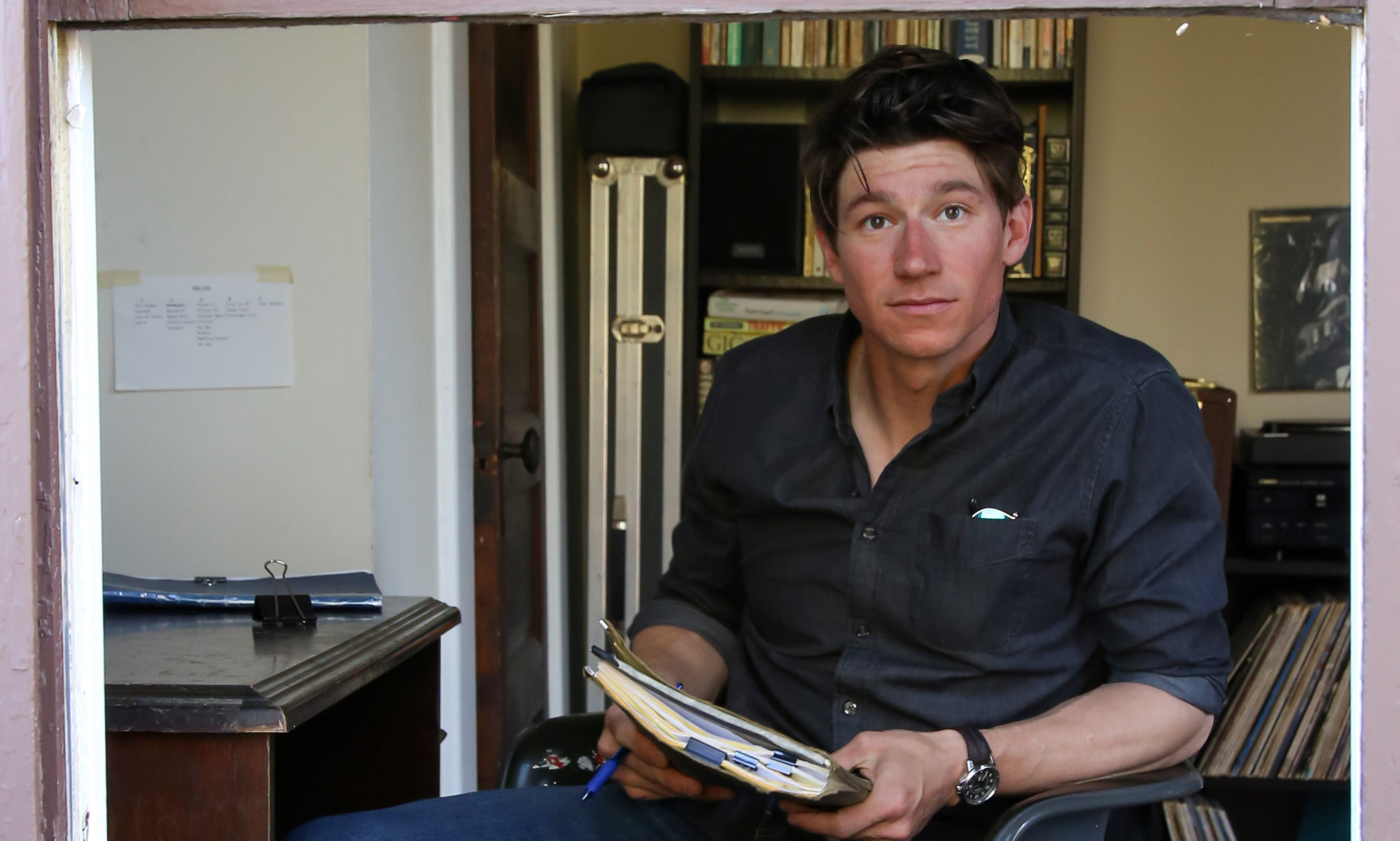By David S. LewisGlance at the clock to uncross your eyes, dry from hours of staring at your computer screen . . . time passing at horribly subsonic speeds. Sit in dead-stop traffic on the freeway, filled with violent thoughts for the other motorists. Get home and yank your lawnmower out of the shed and shove it up and down your yard, constant mortal combat with the strange forces of suburban nature, and convince yourself that this, in fact, is what you would rather be doing . . . this, instead of sailing a boat around the Caribbean like a pirate, or flying a kite, or a helicopter, or a homemade rocket ship.
Learn to enjoy the grind, and forget your childish dreams of freedom.
Or quit your job, and go start a folk band.
At least, that worked for Andy Gallagher.
The 26-year-old former engineer said that, after two years working in the oil and gas industry in Dublin, he quit his high-paying job, paid off his debts, and dedicated his life to playing music. All he had to do was learn how.
Lynsay Bensman, 28, worked with Gallagher at the engineering firm he left.“He was a really good engineer, but that just wasn’t what he wanted to do with his life,” she said in an interview. “Everyone at work loved him. Even the VPs and the bosses thought it was great, that he was following his passion.”
Genesis of a folk hero
Gallagher had been playing guitar and harmonica for some time, but he claims Dave Casto, who runs karaoke “10 days a week at various venues,” taught him how to sing.“He allowed a space, a venue, a moment, where you are allowed to walk in, piss drunk, amplify yourself, and scream your favorite songs in the world,” he said. “Just the opportunity to do that on a regular basis, that’s how someone teaches you to sing. He was like, ‘Well, we aren’t going to kick him out of the bar, I guess.'”
Gallagher spent the next year or so mapping out a project, a concept band called Trains Across the Sea, a reference to a song by indie band Silver Jews.
“I had an entire year of this being my sole focus,” he said.
“And that’s exactly why I started this band,” reads the band’s website. “It’s not that music is powerless to undo the crimes [of corrupt lobbyists and others] of this country, but that music is essential to developing the good and right foundation in those who will inevitably replace them.”
Not many bands have a mission statement. The ones that do tend to sound preachy and are then not quite as entertaining. If Trains Across the Sea has an agenda, it is endemic, not overt; though some songs are clearly possessed of a message (Bikes are cheaper than cars . . . bikes, they are cheaper than cars, the slightly political refrain of “I Just Want to Get Paid,” for example), they remain entertaining and largely light-hearted.
The band instead uses positive energy as a tool of conversion with an overwhelming message: Do what you want to do, and not what you think you are supposed to do.
“I was asked last week, ‘What’s the best part about being in Trains?'” Gallagher told me at the Taj Mahal open mic night, the musical farm from which he mines future members. “I told him, ‘There’s no longer a difference between what I want to do and what I am doing,”‘ he said. “That’s the best part.”
“I think there’s something very intentionally captivating, that there’s this guy on stage who has ‘Be The Change’ written on his guitar, who quit his job, who’s trying to play music in front of people – that’s all very intentionally designed,” he said. “Are you where you want to be? Man, I hope that what you are doing is what you want to do. Do what you want to do,” he said, restating the idea emphatically.
That sentiment, presented by the wrong kind of guy, could be an infuriating and cocky one, but the affable Gallagher seems so earnest, so caring, that you have to consider the question. The kid’s handsome and open, boisterous and jovial . . . and could have been rich as hell, parking a Beemer in front of a McMansion with a trophy lady and a herd of talking purebreds.
Instead, when I arrived at his campus-area house, we drank beer on the porch in the dark, presumably because the bulb had burned out. His comfy furnishings are undeniably modest, and the real action there occurs in the basement, as the normally acoustic act transitions into a plugged-in legit band, with keyboardist Sharon Udoh (aka Counterfeit Madison) on the keys, Adrian Jusdanis on violin, and Joe Gilliland on the electric guitar, with plans to add a drummer later this summer.
Evolution
Trains Across the Sea truly is more an idea than an actual band, as evidenced by its constantly revolving door. The incarnation that played last year’s ComFest was entirely revamped only a few months later. Recently, audiences have been treated to an all-acoustic version of the band, with only Gallagher’s guitar and Jusdanis’ violin roaming the center of the crowd, lyrics often roughly shouted over furious strumming and searing violin solos.“It reduces the boundary between the audience and whoever is on stage,” said Gallagher enthusiastically. (That’s how he says most things.) “Also, it makes it immediately timeless,” he continued. “The technology of the guitar and the fiddle have existed for a long, long time, and so you are digesting it the same way it was heard like 500 years ago.”
As Jusdanis transitions now out of Trains to focus on his other band, Arlo and the Otter, the project’s lineup has changed again. With the relatively recent additions of Sharon’s keys and Joe’s electric guitar, Gallagher has found it necessary to abandon the all-acoustic set in order to be heard. His bandmates are talented and thoughtful, artfully augmenting Gallagher’s songwriting, gracing the slow ones with melodic phrases and harmony singing and imbuing the faster songs with the force of a semi truck careening across the open highway, leaving plenty of space in the music, giving it an open and honest quality that is currently rather rare.
Despite the formidable talent of the current band, Gallagher sees Trains as a constant evolution of music and musicians.
“The reunion show for Trains will have, like, a thousand people,” he laughed. “Who are all phenomenal, which is really weird, because when I started, I was really new, and when you see the talent on this board – it’s just incredible.”
The music lends itself well to both the mission and the presentation of the band. Gallagher relies on a definition of folk music from Bonnie Prince Billy’s Will Oldham:
“Folk music is any music that you get together and play and sing with your friends,” he said. “Anything you all know is folk music.”
“And that’s what we are trying to do with Trains,” he said. “You know: we want a community, for a moment, for an evening, for a set . . .”

